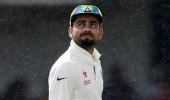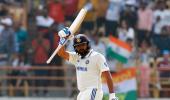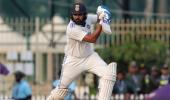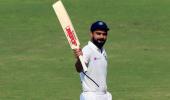
In India, where cricketers are often elevated to demigod status, the final curtain call on their careers often resonates deeply.
While Sachin Tendulkar's 2013 farewell became a national pilgrimage, a vibrant celebration befitting a cricketing deity, the exits of many other Indian icons this century have been quieter journeys into the twilight.
Sachin Tendulkar: The Grand Exit
ODIs: December 23, 2012
Tests: November 16, 2013 (vs West Indies, Mumbai -- his 200th Test)

On November 16, 2013, cricket didn't just witness a retirement -- it marked the end of an era.
Sachin Tendulkar, the most celebrated batter in the history of the sport, played his 200th and final Test match at the Wankhede stadium in Mumbai, his home ground. This wasn't just a cricket match -- it was a national celebration, meticulously orchestrated by the BCCI.
At Tendulkar's personal request, the venue was chosen so that his mother Rajni Tendulkar could watch him play live for the first and only time in his storied career.
The farewell Test against the West Indies was drenched in emotion. Tendulkar scored a graceful 74 off 118 balls, studded with 12 classic boundaries, before being dismissed by Narsingh Deonarine in the 48th over. India cruised to victory by an innings and 126 runs, with Pragyan Ojha starring with a 10-wicket haul. But the result was secondary.
The defining moment came when Tendulkar walked off the pitch -- his teammates lined up in a guard of honour, the Wankhede crowd stood in rapt silence, and millions across the country watched through teary eyes as a chapter in Indian cricket closed.
His farewell speech, delivered with raw emotion, thanked everyone -- from his family and childhood coaches to his teammates and the nation that had adored him for over two decades. It was more than a goodbye; it was a cultural moment etched into the heart of Indian sport.
At age 39, Tendulkar retired with 34,347 international runs from 664 matches -- numbers that tell only part of the story. In a country where cricket is religion, no sporting farewell has ever matched the magnitude of Sachin Tendulkar's final bow.
In contrast to the grand spectacle that marked Tendulkar's farewell, the retirements of most other Indian cricketing legends this century have been quieter affairs -- dignified exits often orchestrated on their own terms.
The exits have been more subdued -- no elaborate send-offs, no goodbye games. Just a quiet wave, a press conference, or sometimes, a social media post.
Laxmi Negi/Rediff revisits those muted farewells -- dignified exits from cricketing titans who let their careers, not their retirements, do the talking.
Anil Kumble: Warrior's Exit
All formats: November 2, 2008 (retired mid-series vs Australia at Feroz Shah Kotla, Delhi)

Anil Kumble's cricketing journey ended just as it was lived -- with grit, quiet dignity, and unwavering commitment to the team.
Minutes after tea on the final day of the third Test against Australia in Delhi, the legendary leg-spinner announced his retirement from international cricket.
At 38, with 619 Test wickets to his name, India's most successful bowler stepped away after 18 years of relentless service.
A deep finger injury -- 11 stitches, bone visible -- finally forced his hand.
'The body was asking questions every day,' Kumble admitted. 'This injury helped make the decision clearer.'
Despite the pain, he bowled a final four-over spell before the match ended in a draw, a testament to his trademark resilience.
At a packed post-match press conference, Kumble removed his cap to a standing ovation from the press, then calmly explained his decision. He had made up his mind the night before but waited to inform teammates individually during the day so as not to distract them from the match.
'I've always put the team above self,' he said, 'and I didn't want to let the team down by playing at less than 100%.'
For Kumble, the writing had been on the wall. The body, he said, kept pushing back. He fought with painkillers and willpower, but this time the injury -- coupled with diminishing returns -- told him it was time.
'You want to perform at a level you're proud of. That wasn't happening.'
Kumble's career was built on defying odds. He lacked the big-turning leg-breaks but made up for it with fierce accuracy, fierce intelligence, and fierce heart.
From being doubted in his early years to orchestrating historic wins overseas -- especially post-shoulder surgery in 2001 -- his second innings as a bowler and leader were even more rewarding.
He exit the stage with 619 Test and 337 ODI wickets, a broken jaw famously taped in Antigua, a 10 wicket haul in an innings against Pakistan, and the quiet authority of a man who led by example.
'I believe this Indian team can go on to be No. 1 in all formats,' he said with confidence, as he passed the Test captaincy baton to M S Dhoni.
With that, one of India's greatest cricketers closed the door on a remarkable chapter -- head high, sleeves rolled, and spirit unbroken.
Sourav Ganguly: Leader on His Own Terms
Tests: November 10, 2008 (vs Australia, Nagpur -- had a farewell series)
ODIs: November 15, 2007 (last ODI played vs Pakistan)

Sourav Ganguly's retirement in 2008 was vintage Dada -- understated, self-assured, and on his own terms. At the end of a routine press conference in Bengaluru, he casually dropped the bombshell, 'Just one last thing lads... this is going to be my last series.'
With that simple line, Ganguly ended all speculation about his future and walked off, no theatrics, no explanations.
Having been dropped from the Irani Trophy and rushed into an India A match for match fitness, Ganguly wasn't even expecting to be picked for the Australia Tests. But once selected, he began preparing -- quietly and intensely.
There was no farewell tour, no celebratory send-off. Instead, Ganguly focused on doing what he always did best: Fighting back and finishing on his terms.
He played his final series with pride, ending a career that spanned 109 Tests (6,888 runs) and 311 ODIs (11,363 runs).

In his final Test at Nagpur in 2008, Sourav Ganguly was given one last captaincy honour by M S Dhoni, who handed him the reins for the closing moments.
India sealed a 172 run win over Australia to take the series 2-0, and Ganguly bowed out with the respect and victory his legacy deserved.
Rahul Dravid: Gentleman's Goodbye
ODIs: September 16, 2011
T20I (only match): June 4, 2011
Tests: March 9, 2012 (announced via press conference)

Rahul Dravid announced his retirement from international cricket in March 2012 with the same quiet dignity that defined his career.
At 39, he stepped away from the game without a farewell match, grand send-off, or any spectacle. Instead, the announcement came during a modest press conference at Bengaluru's M Chinnaswamy stadium, attended by family, teammates, officials, and journalists.
Dressed in his India blazer and seated beside Anil Kumble and then BCCI president N Srinivasan, Dravid delivered a heartfelt speech thanking everyone who had shaped his journey&mdasfrom coaches and selectors to fans and the media.
He revealed that the decision had come after over a year of introspection, and though the Australia tour had been tough, it wasn't the trigger. Rather, he had calmly and rationally accepted that it was time for the next generation to take over.
True to his nature, Dravid exited the stage without fanfare, leaving behind a career built on selflessness, consistency, and grace.
With over 24,000 international runs and unmatched respect in the cricketing world, Dravid proved that you don't need theatrics to make an exit.
V V S Laxman: The Exit That Wasn't
Tests and all formats: August 18, 2012 (announced retirement before New Zealand Test series, didn't play farewell match)
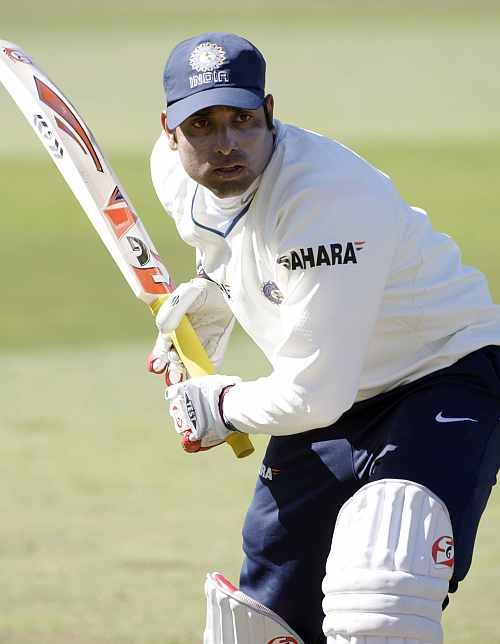
V V S Laxman's retirement at the age of 38, in 2012 was as graceful as his batting -- heartfelt, dignified, and quietly dramatic.
Just five days before the first Test against New Zealand in his hometown Hyderabad, Laxman stunned the cricketing world by announcing his immediate retirement from international cricket. Though named in the squad, he chose to walk away without a farewell match, leaving fans with a bittersweet sense of incompletion -- no final innings, no curtain call.
At an emotional press conference, flanked by family and close friends, Laxman explained that the decision had come after days of deep introspection.
'I've always listened to my inner voice,' he said, 'and it told me this was the right time.'
Despite emotional appeals -- including one from the Hyderabad Cricket Association president urging him to reconsider -- Laxman stood firm. His priority, he said, was to make way for the next generation, especially in home conditions where youngsters could gain confidence.
The decision wasn't triggered by criticism over recent poor form -- he had struggled during India's disastrous tours of England and Australia -- but by a deeper personal conviction that it was time to move on.
Laxman dismissed suggestions that public opinion influenced him, remarking, 'If you try to satisfy everyone in India, where cricket is a religion, it's next to impossible.'
Laxman's career spanned 134 Tests and 8,781 runs at an average of 45.97. His 281 at Eden Gardens in 2001, part of a historic fightback with Rahul Dravid, remains one of the most iconic innings in Test history.
Known for tormenting Australia -- he averaged nearly 50 against them -- he played his cricket with quiet steel and artistic flair.
M S Dhoni: Silence is the Loudest Goodbye
Tests: December 30, 2014 (retired mid-series in Australia, after Melbourne Test)
ODIs and T20Is: August 15, 2020 (announced via Instagram video)
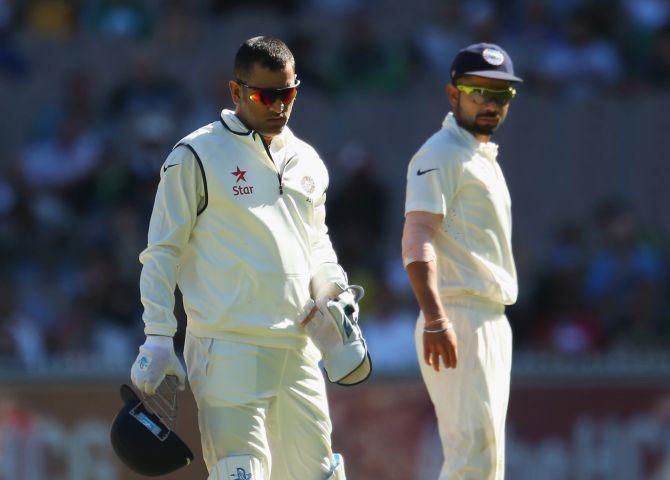
In a stunning move, M S Dhoni retired from Test cricket with immediate effect after the drawn match against Australia in Melbourne in 2014.
Virat Kohli took over as captain for the final Test in Sydney.
Dhoni, batting on 24 when the Test ended with four overs remaining and India at four wickets in hand, made no mention of his retirement during the post-match press conference. The BCCI later confirmed the decision, citing the strain of playing all formats as the reason.
'M S Dhoni, one of India's greatest Test captains, has decided to retire. Under his leadership, India became the No. 1 team in the Test rankings,' the BCCI stated. 'We respect his decision and thank him for his monumental contributions to the game.'
Dhoni's retirement followed months of fitness struggles, including a hand injury that kept him out of the November ODIs against Sri Lanka and the first Test in Adelaide.
The demands of leading India across all formats, coupled with IPL commitments, took a toll. Since 2008, Dhoni had played 398 matches, the most for any cricketer during this period.
He took over in 2008 after Anil Kumble's retirement and led India to No. 1 in the rankings in 2009. Dhoni's final tally included 90 Tests, 4,876 runs, a high score of 224 against Australia, and 294 dismissals as wicketkeeper.
His retirement was in keeping with Dhoni's unique approach to the game.
Dhoni's 2020 retirement from international cricket was as unconventional as his career. True to his enigmatic style, he announced his decision with a simple yet powerful Instagram post on August 15th.
The post, featuring a montage of his career highlights set to a Hindi song and a brief caption of gratitude, stunned fans. With no prior speculation or farewell series, it was a classic Dhoni move -- direct, understated, and on his own terms, reflecting his calm, decisive leadership on the field.
Ravichandran Ashwin: A Champion's Curtain Call
All formats: January 15, 2025. Mid Test series against Australia, announced via a press conference

Ravichandran Ashwin retired from international cricket with immediate effect following the third Test of the Border-Gavaskar Trophy in Brisbane.
He confirmed the decision at a press conference, saying, 'This will be my last day as an Indian cricketer in all formats at the international level.'
Ashwin reflected on his career, mentioning the memories created alongside teammates like Rohit Sharma, Virat Kohli, and Ajinkya Rahane, and expressed gratitude to the BCCI and his fellow cricketers. He also thanked the Australian team for their fierce competition and said he would continue to be involved in cricket, potentially in club-level formats like the IPL and TNPL.
Ashwin's decision followed a period of declining involvement in the Test XI. At 39, with India's next overseas series in England, his role in the squad had diminished.
In the Test series against Australia, he played only one Test, taking 1 for 53. He had struggled in the 3-0 home loss to New Zealand, averaging 41.22 with the ball.
Ending his Test career as India's second-highest wicket-taker with 537 wickets from 106 Tests, Ashwin's impact was undeniable. He averaged 24 and was part of an elite group of allrounders with over 3,000 runs and 300 wickets.
His record includes 3,503 runs, six centuries, and 14 fifties. He also won 11 Player-of-the-Series awards, tying the record with Muthiah Muralitharan.
Ashwin's retirement marked the end of a remarkable international career, cementing his legacy as one of India's greatest match-winners.
Rohit Sharma: A Quiet Departure in Whites
Test Retirement: May 7, 2025, announced via Instagram post
T20I Retirement: July 1, 2024 after winning T20 World Cup
Still playing ODIs (as of 2025)

Rohit Sharma announced his retirement from Test cricket via an Instagram post last week, making the decision public just ahead of India's tour to England.
His announcement came without a farewell series or a final match, as his last Test appearance was against Australia in Melbourne in December 2024.
In his post on Instagram, Rohit expressed gratitude for the opportunity to represent India in whites, stating, 'It's been an absolute honour to represent my country in whites. Thank you for all the love and support over the years. I will continue to represent India in the ODI format.'
This decision follows a challenging period for Rohit, including a poor run in the series last year against Bangladesh, New Zealand, and Australia, with the latter marking a particularly dismal tour where he averaged just 10.93 across eight Tests.
Rohit retires with 4,301 runs in 67 Tests, averaging 40.57, with 12 centuries and 18 half-centuries to his name, including a career-best 212 against South Africa in 2019.
Despite his strong legacy in limited-overs cricket, his form in Tests had waned, culminating in a series of low scores. His absence from the first and last Tests of the Australia tour, the first for the birth of his child and the last due to poor form, led to speculation about his future in the format.
Having led India to victory in the 2025 Champions Trophy, Rohit was aware that success in ICC tournaments wouldn't guarantee his place in the Test side, prompting his decision to retire.
With India's five-Test series in England set to begin on June 20, the BCCI now faces the task of naming a new full-time Test captain.
Virat Kohli: The Reluctant Exit
Test Retirement: May 12, 2025, announced via Instagram post
T20I Retirement: July 1, 2024 after winning T20 World Cup
Still playing ODIs (as of 2025)

Virat Kohli announced his retirement from Test cricket at the age of 36, ending a remarkable 14-year career that spanned 123 Tests, including 68 as captain. During this time, he scored 9,230 runs at an average of 46.85.
In a heartfelt social media post, Kohli shared, 'It's been 14 years since I first wore the baggy blue. I never imagined the journey this format would take me on. Test cricket has tested, shaped, and taught me more than I could've hoped for.
'Stepping away feels right – I've given it everything, and it’s given me more in return. I leave with a heart full of gratitude for the game, my teammates, and all those who supported me.'
Ahead of India's five Test series in England starting June 20, Kohli had informed the BCCI about his decision to retire, following months of reflection.
Though he marked a strong return with a century in Perth in November 2024, his recent form had dipped. His average, which peaked at 55.10 in 2019, had fallen to 32.56 over the past two years.
Kohli's Test career began in 2011 during India's tour of the West Indies, where he made a quiet debut. However, he soon announced his arrival, with a key century in Adelaide during India's challenging 2011-2012 tour of Australia.
His real breakthrough came in the 2014-2015 series in Australia, where he scored four centuries and amassed 692 runs at an average of 86.50.
By 2014, Kohli had taken over as India's Test captain after M S Dhoni's retirement from the format. Under his leadership, India won 40 of the 68 Tests Kohli captained, making him India's most successful Test captain.
With 40 wins, Kohli ranks 4th globally in Test captaincy wins, behind Graeme Smith, Ricky Ponting, and Steve Waugh.
One of Kohli's crowning achievements came during the 2018 tour of England, where he scored 583 runs at an average of 59.30, including two centuries, after struggling in the 2014 series. His golden run between 2016 and 2019 saw him score 3,596 runs in 35 Tests at an average of 66.59, including 14 centuries and eight fifties.
Kohli leaves behind a legacy as one of the greatest players in Test cricket history, having redefined the standard for batting and leadership.

